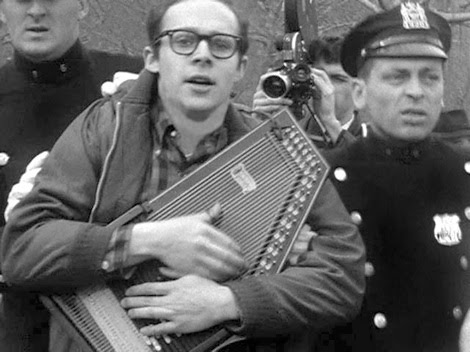Blu-ray Review: Criterion's INSIDE LLEWYN DAVIS, The Full Ballad
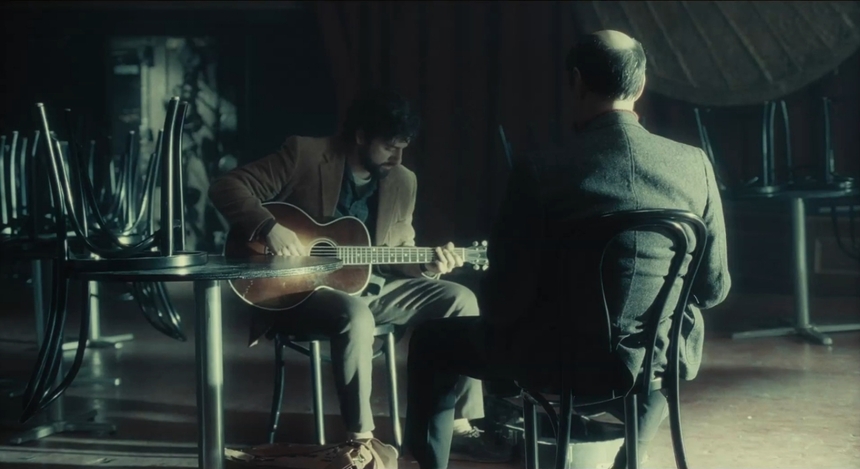
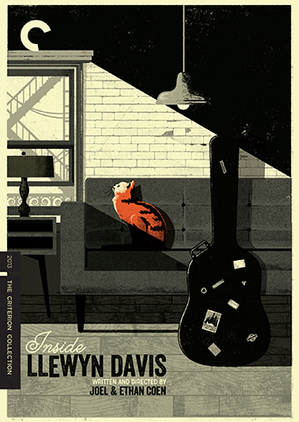
And who was initially offering the Gaslight it's steam, making it a desirable homecoming for truth seekers like Dylan? It was people like Dave Van Ronk, who is, to this day, known as "The Mayor of MacDougal Street" - a name that also serves as the title of his memoirs, cowritten by Elijah Wald. The memoirs delight in recounting the salad days of Greenwich folk's purest form before outsiders began bandwagoning and contaminating the scene with careerist ambition. This is not meant to apply that Bob Dylan was bandwagoning exactly - he did after all Greyhound to NYC from Minnesota with the prime intention of spending Woody Guthrie's final days by his bedside - but there is at least a sense of tongue-in-cheek fist wagging on Van Ronk's part, for all the times Dylan sponged his lessons and stole his thunder only to eventually swallow the entire movement with Dylan's increasing popularity and inspire self-doubt among the most authentic of the lot.
Columbia Records, is, and always has been a major establishment in the business of selling pop music to the masses. What 'pop' entails is an almost random entity entirely subject to a given era. Should the limelight arbitrarily land on folk, the job of the record company becomes to produce a safe outfit that checks the boxes of what researchers decide is trending. Very rarely, an entirely different entity squeaks through onto a major label with such miraculous talent and force, no record company or audience could shape it. Before Dylan, making a million dollars with folk music didn't even occur to anyone. If anything, success was seen as a sign of illegitimacy. And in a scene where the most authentic singer/songwriters were determined by those who dug the furthest back into the lineage of the roots ballad to weave a timeless tale, here was a man looking forward through original material. If they were jealous of Dylan's Columbia contract, what did it say about their roots-values and the integrity of their so-called purity.
These are just some of the events and ideas that serve as the Coen brothers' jumping off point. Though the character, Llewyn, has more than a few references to the real life mayor of MacDougal street as source material - even going so far as to borrow the album title - "Inside Dave Van Ronk" - Llewyn Davis is no more a faithful representation of Van Ronk than O Brother tells the story of "Homer's Odyssey", or The Hudsucker Proxy tells the story of the hula hoop (y'know, for kids!), or Barton Fink as modelled after Otto Friedrich. The Coens have a long-running tendency to take a big event and hang it on the shoulders of the most unlikely, ordinary character (The Dude as Phillip Marlow, the small town Minnesota police dealing with unfathomable evil, a simple suburban Jew versus mortality etc). "It would never have occurred to us to make a story about a successful folksinger", says Ethan Coen. In Davis, The Coens found the perfect framing device for their tale of authenticity in the struggle of art versus commerce, integrity of ambition versus selling out.
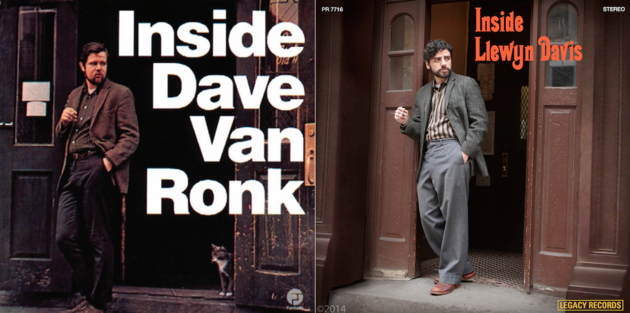
The Greenwich Village folk scene is the perfect landscape for this discussion based on the genre's ideals and the irony of co-opting said ideals for commercial purposes. Llewyn Davis lives and breathes his music. He identifies with folk because it was founded on truth and cutting through the lies of the establishment to dig at the heart of a matter. Folk is an oral tradition based on universal themes and timeless truths. Like the Delta blues, folk is a medium for the downtrodden underdog to communicate a suppressed voice. But folk, like any other genre, is still music after all, and all too easy to confuse with entertainment.
When the Gorfeins ask Davis to perform at a dinner party, he obliges out of politeness only to end up feeling like a parlour trick. When he gets touchy about the music that means so much to him being turned into a sing-along, Mrs. Gorfein cries, "but I thought music was a joyous expression of the soul!" For Davis, and the heroes of Bohemia before him, music is certainly an expression of the soul, but joyous does not necessarily enter the equation. Sadly, in order for the voice to financially flourish, the soul is judged for its market place value. Purity is in the eye of the beholder and in terms of pop music, it is most certainly not the point. And yet it's entirely the point of roots music! Of all the things to be coopted and milked for its pop market potential, folk as pop is the most unlikely and ironic pop genre of the 20th century. Davis, whose songs look back to the field recordings of Alan Lomax, must suffer the success of sweater acts and folk trios with pretty harmonies. In a world where everyone's starting to sing Kumbaya, Llewyn's heart is hurting and his music is all he can do about it. With his Gibson G1, he taps into Robert Johnson, singing songs that were never new and would never get old. If Davis is to earn his living, he must resort to session playing on absurd bastardizations of the medium for Columbia like the incredibly tacky Please Mr. Kennedy (inspired by The Goldcoast Singers). Llewyn has no qualms leaving his name off the session credits.
The Coens have a devilish knack for lampooning existentialism. They're kings of the cosmic joke. Take ordinary shmoe Larry Gopnik, who does everything by the book. He's faithful, he provides for his family, he tries to be a serious man. And yet his life plays out like a sick version of The Book of Job as written by Voltaire a la "Candide" or Nathaniel West's "A Cool Million" - stories that provide blackly hilarious tellings of the hero's mis-journey. In this spirit, the Coen's delight in the tragic underbelly of the music they love. Folk, in its pop incarnation, is so funny because of how seriously it took itself, making it ripe for parody. But where A Mighty Wind is funny via exaggeration, the Coens need only highlight incarnations of real moments. Whether absurd or absurdly affecting and meaningful, through their lens, all the comedy and tragedy exists as one. Even Llewyn, a character the Coens love enough to bestow upon the repertoir of Van Ronk, isn't safe from the hypocrisy of his own integrity.
Greenwich Village was an extremely unique scene, appealing not just for its music, but the bohemian ideals its inhabitants live and sing about. Within such a thriving culture, founded on the integrity of ideas over possessions, purity is the currency. But the Coens have grown less clear about what artistic purity is exactly - though it's a question they've been asking long before Barton Fink. On the village streets, is purity found in the soulful troubadours like Llewyn, who sing within a long lineage of old songsmiths with the same heart and understanding? Is it the junky hepcat poet, who whacks his cane at Llewyn, while regaling him with beat wisdom, preaching the superiority of jazz? Is it the housewife with the cat-eye glasses and the auto-harp? Or is it her husband who thinks his wife's folk hobby and everyone involved within it are all bullshit? Maybe it's Dylan, who beat-movement original, Allen Ginsberg, thought, "had found a way in public to be almost like a shaman, with all of his intelligence and consciousness focused on his breath". Perhaps, but if Davis were to bump into Dylan in a few year's time, like a figure out of the song "Positively 4th Street", he'd find an artist also grappling with questions about the nature of authenticity as well.
It's almost unimaginable that the Coen brothers this late in their careers, after having produced countless works of cult favourite status, are still capable of releasing films worthy of mentioning within the conversation of their finest hour. Somehow, Inside Llewyn Davis delivers as one of their most impressively realized, heart-wrenchingly tickling works to date, which speaks volumes. Thankfully, the Criterion Collection agrees with this sentiment and consequently, this month, fans are gifted with the long-awaited Coen Criterion release they've long deserved. It's always somewhat of a special occasion when Criterion looks to films of recent years, but I enjoy imagining someone 50 years down the line popping in this relic like we currently do for films of the 60s. In Inside Llewyn Davis, future collectors will see an old film about an older bygone time in music that itself looked back to the roots of the medium for the truths contained within - wisdom that was always there and isn't going anywhere. Inside Llewyn Davis may currently feel new, but its themes flare ancient tensions between artistry, performance, and success that artists have been facing for centuries and still remain as relevant as ever. That said, if the film was never new and it never gets old, it must be a folk song.
The Supplements
Sunday (1961)
A short film by Dan Drasin documenting a 1961 clash between folk musicians and police in Washington Square Park is included for archival purposes. Those familiar with Greenwich origins know that the scene started on Sundays at Washington Square Park, where musicians would gather weekly to trade verses and licks before someone had the bright idea of packaging Sundays into year-round coffee houses. Sunday depicts a day when the folkies failed to get a permit but showed up regardless to exercise their free voice. Sunday is historically fascinating and often hilarious in terms of its subject's folk martyrdom. Is there a funnier image than the Jewish kid being taken away by the police as he sternly clutches his autoharp? The Coens think not. And not even the autoharp yielding lady of the final Gaslight scene can compete.
Audio commentary
Authors Robert Christgau, David Hajdu, and Sean Wilentz - three 60s historians of sorts - offer countless insights into the bizarre folk phenomenon, which as far as pop music is concerned, may be the only time pop looked back into the past. The culture experts provide valuable footnotes to a film so dense it must be a Coen product. You'll learn about the Robert Johnson Gibson G1, which Davis picks as his spirit instrument. You'll discover likely characters' source inspiration for folks like Al Cody, who I personally had not made the connection to being a poor man's Ramblin' Jack Elliott.
Before The Flood
A new piece about the early sixties Greenwich Village folk scene, featuring music writer and historian Elijah Wald, co-author of "The Mayor of MacDougal" Street. Before The Flood takes its name from the Dylan and The Band live album of '74, but focuses on the innocent Greenwich days prior to Dylan's impact. Wald offers pivotal insights like the effects of the cabaret license on the burgeoning scene. Apparently a law was in effect that prevented clubs from serving alcohol or featuring horn bands of four or more members without a cabaret license. When club owners realized they could open all night coffee shops in a trending neighbourhood featuring soft string bands, they saw a win-win situation. And given that artists played for the basket - sometimes having to split it - entertainment came free. But most valuable of all is the picture Wald paints of the low cost of living in this landscape, where people could easily get by on the basket. "People didn't care about making a living."
The First Hundred Feet
The First Hundred Feet offers a dense conversation between filmmaker, Guillermo Del Toro and the Coen brothers - the premise being that all directorial preoccupations and styles exist in crude form within the first hundred feet of a filmmaker's first feature. Thus, much of the focus centres around Blood Simple. Del Toro is a positive presence on DVD supplements, as some of us learned from the features of Brian DePalma's Phantom of the Paradise. Here he's on his A-game, offering the Coens valuable food for thought for which they're always happy to expand upon.
Inside "Inside Llewyn Davis" (2013)
The centrepiece of the features is this 43 minute documentary overview. If you're only going to watch one feature - which would be a mistake - because of its all-encompassing coverage, this is clearly the one. We have the cast, the session musicians, the art directors, the always well-spoken Coens, and their finest collaborator next to Roger Deakins, T Bone Burnett. Priceless quotes are in abundance and come faster than you can process. I'll take one example from Oscar Isaac, who comments, "Whenever I didn't treat it like a comedy, the Coens would laugh the most - so whenever I was in the most pain." He adds, "Life is a cosmic joke and it's funnier if you get the joke."
Another Day, Another Time (2013)
A 101-minute concert documentary celebrating the music of Inside Llewyn Davis, featuring Joan Baez, Marcus Mumford, Punch Brothers, Gillian Welch, Jack White, and others. The title is taken from Dylan's Farewell, which goes "So it's fare thee well my own true love / We'll meet another day, another time / It ain't the leavin' that's a-grievin' me / But my true love who's bound to stay behind." Over 50 years after Llewyn was left to wallow in his broken dreams, the musicians behind the film's soundtrack, as well as other special guests, meet in a very different place at a very different time to honour folk of ages.
The Art of Folk
This is possibly my personal favourite of the features. The Art of Folk captures an epic conversation between music producer, T Bone Burnett and the Coens about folk music enhanced using excellent illustrations by Drew Christie. T-bone and the Coens discus folk origins and the extremely specific loaded song choices included in Davis' repertoire. The conversation primarily surrounds the aestheticizing of authenticity and understanding the type of artist who would choose a Gaelic lullaby as his one shot showcase for Bud (Albert) Grossman. As Dylan - Grossman's client - inadvertently demonstrated, music can offer a means to live forever. That anyone should deeply desire such a goal, whether actively or subconsciously, is enough to make the Coens question the sanity of the entire ambition.
PLUS: An essay by film critic Kent Jones
4K digital transfer, approved by directors Joel and Ethan Coen, with 5.1 surround DTS-HD Master Audio soundtrack on the Blu-ray
A very special thanks to Toronto's Bay Street Video for their assistence with this piece.
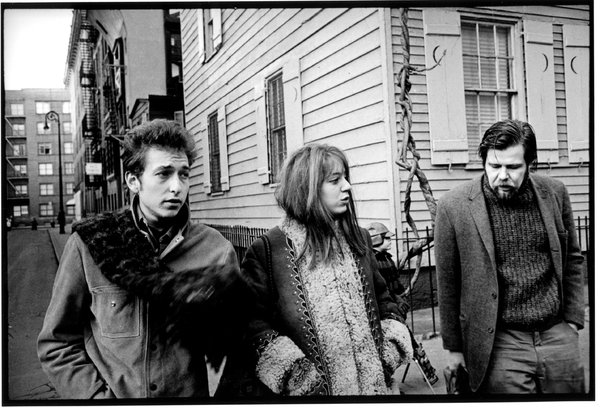
Inside Llewyn Davis
Director(s)
- Ethan Coen
- Joel Coen
Writer(s)
- Joel Coen
- Ethan Coen
Cast
- Oscar Isaac
- Carey Mulligan
- Justin Timberlake
- Ethan Phillips

Do you feel this content is inappropriate or infringes upon your rights? Click here to report it, or see our DMCA policy.


